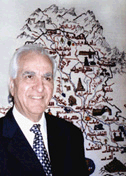Tourism and the Constitution
Through our participation in international travel and tourism exhibitions, and from our personal experience of travel in most Arab and European countries during the past 58 years, we have developed a vision of an enlightened form of tourism, which guarantees future benefits for the countries visited. Tourism means freedom, democracy, and industrial, economic and social development for a country and its people. It is also a factor in resolving differences between nations and eliminating all forms of extremism. God said: "Ø´ men! We created you of a male and a female, and We made you nations and tribes, so that you may come to know one another. "(Al-Hujurat/13).
The development of the constitution usually relates to aspects of general policy, such as the separation of and limits of power and the rights of the individual but does not approach the scientific and cultural fields, one of which is tourism. Tourism, its development and expansion, was omitted from the constitution because it did not develop alongside other civil and technological sciences, which helped to build bridges of understanding between different peoples.
In future, committed tourism will play a major role in Muslim countries, among them Iraq. In Iraq there is a tremendous potential for the development of tourism as long as it exploits its resources wisely and builds the required tourist infrastructure, without compromising its values and religious beliefs. That is why tourism has to be taken seriously by legislators and must be mentioned in the constitution.
The World Tourism Organisation (WTO), under the umbrella of the UN, has to be commended for holding conferences on the future criteria for tourism, in particular with regard to ethical and environmental considerations. A code was proposed during the WTO congress in Istanbul in 1977 and, subsequently, in 1999 a ten-point code was established relating to the preservation of tourist resources throughout the world and the equitable division of proceeds from tourism. This code was adopted by the UN in 2001. It is based on the principles of durability, participation of the local inhabitants in planning, and the development and control of tourist activities. Nine points are concerned with the preservation of tourist destinations, the activities of governments, companies, travel agencies and professionals working in tourism, and the role of investors. The final point deals with the application of the articles of the code, through the formation and work of the International Committee On Ethics In Tourism. Seventy WTO member states took part in the development of this code.
If tourism attracts the interest of international law and is adopted by a major international institution such as the UN, the constitutions of Arab countries may find it very beneficial to include articles relating to tourism. It should be noted that Arab countries, such as Egypt and Tunisia, and Muslim countries such as Indonesia, played a significant role in the International Committee On Ethics.
Arab countries have a variety of tourist attractions ranging from beach tourism to religious tourism. The countries of the Maghreb placed the emphasis on beach tourism. Egypt offers a variety of attractions including beach tourism, religious sites and Al-Azhar University, Al Hussein Mosque, Assaydat Zaynab, and other mosques and religious places. The Eastern Arab countries also have beaches and areas of historical interest, with a special emphasis on religious tourism, particularly in Saudi Arabia, Iraq and Palestine.
Given the specific religious sensitivity of the Arab region and Arab-Islamic ethics and traditions, it is essential to work out ethical rules specific to this area which can be made known to the whole world. These values can also make a contribution to the ethical code of the WTO.
The constitutions of Islamic countries were written at a time when tourism was not very important and it may not be possible to amend them as governments have other priorities. Iraq presents a unique opportunity to introduce into the proposed new constitution an article related to tourism. At present there are attacks on human values by certain groups infiltrating from abroad, that afflict Iraq, but this nightmare will soon disappear; neighbouring states have to co-operate to put an end to it, so that the wind of freedom can also blow in their direction. Freedom is the life blood of tourism and the key to a prosperous future for all.
We hope that those who are working on the Iraqi Constitution will be interested in all aspects of tourism and its development, with special emphasis on freedom to travel to and from the country. This is important because Iraq is surrounded by six countries, which all have unique tourist and religious assets of international renown. If visitors can move freely and safely between these countries they will be rewarded with great cultural treasures.
We ask the commission in charge of drafting the constitution to study the issues of Islamic Tourism and its website, which currently attract the interest of European and international universities. There are many articles on tourism in Iraq, in particular my two articles: "Will Iraq become a Mecca of tourist destinations? "( Issue 7) and "River Tourism "(Issue 8). In these articles, Iraq’s main tourist sites are highlighted and I extend an invitation for investment in tourism in the river areas and marshlands.
Religious tourism is currently the main form of tourism in Iraq. It was allowed to develop as it was not in conflict with the country’s traditional values.
But, if one wants to consider the opening of Iraq to other kinds of tourism, it is essential that certain standards are set and codes of practice adhered to. Some are outlined by the WTO; others require detailed study for inclusion in the constitution. The WTO has valuable guidelines on the preservation of local communities from the negative effects of tourism, which is especially relevant in the case of the Iraqi marshlands.
Without going into the legal details, we believe that merely including tourism in some articles of the constitution would be sufficient to enable the country to meet the challenges of the future and guarantee investment in this vital industry.
It is also necessary to determine the sectors which will invest in tourism: public, local, Arab and international and to mention the significant role of the infrastructure, such as tourist facilities, means of transport etc. Training is essential along with the creation of faculties specialized in all aspects of the tourist trade. Management training will include historical information, the ethics of the trade and foreign languages. Tourist chambers, with the participation of all ministries, publicly-owned establishments and professionals who will deal with the development of tourism and the widening of its prospects, have to be established.
We have corresponded on this matter with the interim Prime Minister of Iraq, Dr. Ibrahim Al-Jaafari. He was provided with extensive information and files, copies of which were also sent to the commission in charge of writing the constitution and to the organizations concerned with tourism. We hope that they will take our proposals seriously, because major reconstruction is required in Iraq. This has to be based on the right concepts. If the new Iraqi constitution makes a serious mention of tourism, it will be a happy initiative for the neighbouring countries, and the other Arab and Muslim countries. We beseech God the powerful to help us to render service to our Islamic community, in general, and to our dear Iraq, in particular.
May God guide us to success.
A. S. Shakiry
|

